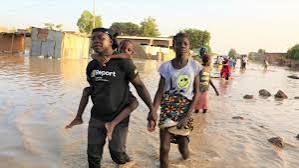Daud Olatunji
At the heart of the ongoing United Nations Climate Summit in Baku, Azerbaijan, Nigeria’s Minister of Environment, Balarabe Lawal, made a compelling case for climate justice.
Addressing over 60,000 delegates gathered to tackle the global climate crisis, Lawal declared, “Our people are suffering for emissions they did not create.”
His words underscored the unequal burden borne by nations like Nigeria, which contribute minimally to global emissions yet face the brunt of climate change’s devastating impacts.
… A Crisis Rooted in Injustice
Nigeria, like much of Africa, accounts for less than 4% of global greenhouse gas emissions. Yet, the country is grappling with severe climate consequences, including catastrophic floods, worsening desertification, and extreme weather events that have displaced millions.
This year alone, communities across Nigeria have experienced widespread destruction of homes, farmland, and critical infrastructure due to these events.
Minister Lawal called for $1.3 trillion in annual climate finance, emphasizing that this demand is not an appeal for charity but a plea for justice. “Developed countries are built on the back of pollution over centuries,” he stated.
“Our people have been providing subsidies for centuries, and this has come at a cost to our lives and livelihoods.”
… The Financial Mirage
While developed nations have pledged billions to aid developing countries in combating climate change, accessing these funds has proven to be a significant hurdle.
Lawal criticized the current financing mechanisms, which often prioritize loans over grants, exacerbating the debt burdens of nations already struggling with economic challenges.
“The finance issue is becoming a mirage,” he lamented. “The more we talk about it, the more it disappears.”
This sentiment was echoed by Sierra Leone’s Environment Minister, Jiwoh Abdulai, who highlighted the bureaucratic obstacles that prevent African nations from accessing much-needed funds.
“We are drowning in promises and paperwork,” Abdulai said. “This is a matter of survival for us. We need fairness, not empty rhetoric.”
… A Continent’s Shared Struggle
Other African leaders at the summit reinforced Nigeria’s stance. Gambia’s Minister of Environment, Climate Change, and Natural Resources, Honge John, decried the inequitable distribution of climate finance.
“Africa accounts for less than 4% of global emissions, yet we bear the heaviest burdens,” he said. John proposed a more equitable framework for fund disbursement, ensuring that vulnerable nations are prioritized.
South Africa’s Minister of Forestry, Fisheries, and the Environment, Barbara Creecy, highlighted Africa’s potential to lead in renewable energy development.
“We have the resources, but we lack the financing,” she said, referencing South Africa’s ambitious plans for solar and wind energy.
“Creecy called for partnerships that deliver tangible results, urging long-term investments in Africa’s green transition.
… The Human Toll in Nigeria
The impacts of climate change are evident in Nigeria’s rural and urban areas.
Farmers in the northern regions face diminishing harvests due to desertification, while coastal communities in the Niger Delta contend with rising sea levels and intensified flooding.
These climate shocks threaten food security, displace populations, and deepen poverty, undermining decades of development progress.
The 2022 floods, described as the worst in a decade, displaced over 2.5 million Nigerians, killed hundreds, and left thousands homeless.
The economic losses ran into billions of dollars, with critical agricultural regions left in ruins. Experts warn that without urgent climate action and adequate funding, these events will become more frequent and severe.
… The Call for Global Responsibility
As the summit continues, Nigeria’s delegation is amplifying its call for developed nations to fulfill their historical responsibility.
The principle of “common but differentiated responsibilities” recognizes that wealthy nations, which have contributed the most to global warming, must lead in financing mitigation and adaptation efforts.
“This is not just about reducing emissions; it is about addressing a developmental crisis,” Lawal said. He stressed the need for climate finance to prioritize grants, public funds, and investments in renewable energy to ensure a just transition for African countries.
… A Way Forward
The stakes are high for Nigeria and the African continent as a whole. With its abundant solar and wind resources, Africa has the potential to become a global leader in clean energy.
However, unlocking this potential requires substantial investment, technology transfer, and international cooperation.
“This is not charity,” Lawal reiterated. “It is about justice.”
Do you want to share a story with us? Do you want to advertise with us? Do you need publicity for a product, service, or event? Contact us on WhatsApp +2348183319097 Email: platformtimes@gmail.com
We are committed to impactful investigative journalism for human interest and social justice. Your donation will help us tell more stories. Kindly donate any amount HERE






